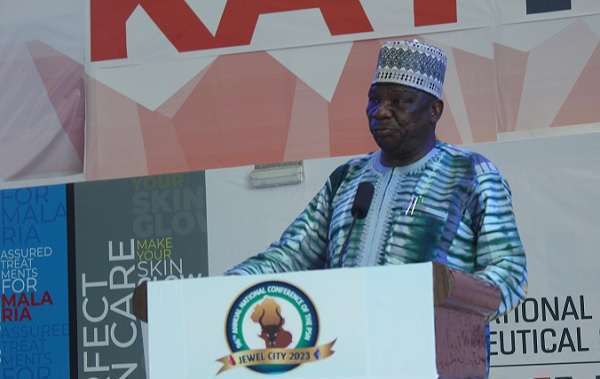
Pharmacists have been tasked to look inward and work with other healthcare professionals to intensify local drug production and ensure that every Nigerian has access to affordable quality drugs and sound healthcare.
The Deputy Governor of Gombe State, Dr Manassah Daniel Jatau, made the call while delivering his keynote address at the recent 96th Annual National Conference of the Pharmaceutical Society of Nigeria (PSN), held in Gombe State, with the theme, “Pharmacy Practice: A Pivot to Universal Health Coverage in Nigeria”.
Universal health coverage, as posited by the World Health Organisation, implies that “all people and communities have access, without any kind of discrimination, to comprehensive, appropriate, and timely, quality health services, determined at the national level according to needs; as well as access to safe, effective, and affordable quality medicines, while ensuring that the use of such services does not expose users to financial difficulties, especially groups in conditions of vulnerability.”
Jatau, in his address, noted that pharmacy practice is pivotal in attaining universal health coverage, which, is goal 3 (8) of the Sustainable Development Goals (SDG) of the United Nations that must be achieved by 2030. He added that for the goal to be achieved, there is an urgent need for reforms that will ensure genuine support for local production of pharmaceuticals.
The Gombe deputy governor specifically charged the Nigeria Academy of Pharmacy (NAPharm) to spearhead the reforms that will revolutionise local production of pharmaceuticals in the country.

While asserting that there is no ailment without a cure, Jatau stressed that it is the responsibility of pharmacists to find cures to ailments by ascertaining which ailment a herb or plant can cure. He also called on all stakeholders in the pharmaceutical industry to step up in filling the lacuna created by the exit of some drug manufacturing companies from the country.
The keynote speaker pointed that society is concerned about the sick because the sick are unable to perform the roles expected them, which disrupts the functioning of society. He added that such negative outcomes can only be averted when pharmacists, with the support of other health professionals, put their heads together to minimise disease burden through quality healthcare service delivery.
Jatau, who noted that it was not surprising that the Millennium Development Goals came and went unattained in Nigeria, avowed that the same fate awaits the Sustainable Development Goals, especially universal health coverage, unless sincere efforts are made by all stakeholders to avert this. He called on pharmacists to play their roles in this regard by ensuring continuous production and access to drugs in the country.
According to him, “As pharmacists who are expected to identify, research, and produce the drugs for use, your tasks are enormous and almost herculean. The new challenges I have for you is to look inward, consider local content, partner and liaise with relevant stakeholders, and produce drugs in our environment, using plants, animals, birds, etc., which we must accept that the nation has been blessed with in abundance.
“You are to research, test-run and eventually produce medicines for use from our own environment. We are encouraged by the position of criminologists that “somewhere, somehow lies the solution to every problem”. Similarly, one of the popular religious books teach us that there is no disease that God sent to mankind that He has not created the medicine or remedy for it much earlier.
“I appeal to you and the pharmacy profession to please do all you can to discover and unveil the already existing remedies to ailments. It may interest you to know that in line with the functionalist theory, virtually everything that nature provides is a medicine of one disease or the other, just waiting for human beings to discover and pinpoint the disease that it cures.
“I strongly believe that if we apply the system theory which does not underrate the contributions of any actor or stakeholder in the successful accomplishment of a task, our story will change toward progress.
“In essence, if we close ranks, and break all barriers/boundaries between modern pharmacists, traditional medicine practitioners, and even the clients (those that patronise our services), I am convinced that we can come up with efficacious drugs that will be used in place of the imported medicines.”
The deputy governor equally averred that, with the Nigeria’s Traditional Medicine Policy of 2007 in place, producing medicine locally will reduce, to the barest minimum, the inherent tendency of seeking medical treatment abroad, which he said had gulped over $1.9 billion as of September 2023, citing the Nigerian Association of Resident Doctors (NARD).
He further emphasised that increased local production of drugs will greatly reduce the importation of unnecessary medicines that is currently giving room for importation of fake, and substandard, adding that it will also enhance exportation of manufactured traditional medicines.
Jatau also stated that improved local production of drugs will provide jobs in the area of conservation, cultivation, harvesting, drying and processing of medicinal plants; build capacity in all areas of traditional medicine development, such as agro, forestry, manufacturing, distribution and marketing; while also helping in the fight against deforestation and addressing climate change.
“With herbal gardens and traditional medicine forests established and preserved, more green areas will emerge in our environments”, he said.
Earlier in his remarks, Chairman of the opening ceremony of the PSN conference, His Royal Highness, Igwe (Dr) Oranu Chris Chidume, Eze Ana-Ukwu, Eze Igulube of Amor, Ayamelum Local Government Area of Anambra State, stated that Nigeria has no reason to be importing drugs. He therefore called on the government to put measures in place to grow the nation’s pharmaceutical industry, even as he called for collaborations among local pharma companies.










